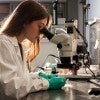
Targeting mitochondria to fight leukemia: Rice-led research team pursues new treatment strategies
Acute myeloid leukemia remains one of the most aggressive and deadly forms of blood cancer, even as treatments have advanced in recent years.

Targeting mitochondria to fight leukemia: Rice-led research team pursues new treatment strategies
Acute myeloid leukemia remains one of the most aggressive and deadly forms of blood cancer, even as treatments have advanced in recent years.

Xie recognized for innovation in quantum phenomena
Rice's Yonglong Xie has been recognized for his innovation in quantum phenomena.

Top US physicists gather at Rice for national particle physics meeting
Rice hosted scientists from more than 40 institutions for the 2025 U.S. CMS collaboration meeting.

6 natural sciences students awarded Moody Fellowship
Six undergraduates from Rice University’s Wiess School of Natural Sciences have been awarded research fellowships as part of the Russell Shearn Moody Pathway to Research in the Natural Sciences.

Rice-led research team develop super material that could change electronics
A research team led by physicists Ming Yi and Emilia Morosan has developed a new material with unique electronic properties that could enable more powerful and energy-efficient electronic devices.

In a new study published in Nature Astronomy, researchers from Rice and the Planetary Science Institute used complex simulations to show that wide-orbit planets are not anomalies but rather natural by-products of a chaotic early phase in planetary system development.

Jonathan Ajo-Franklin, a leading mind in applied geophysics and Trustee Professor of Earth, Environmental and Planetary Sciences at Rice, has been awarded the 2025 Reginald Fessenden Award by the Society of Exploration Geophysicists.

Sex-specific climate responses in plants reveal flaws in biodiversity forecasts
A new study highlights the need to refine biodiversity forecasts to account for the sex-specific responses to Earth’s changing climate.

Rice chemist Kürti named 2025 Ross M. Brown Investigator for energy research
Rice chemistry professor László Kürti is a recipient of the 2025 Ross M. Brown Investigator Award.

Recently, a team of scientists and engineers at Rice discovered a phenomenon on a microscopic scale, where tiny magnetic particles driven by rotating fields spontaneously move along the edges of clusters driven by invisible “edge currents” that follow the rules of an unexpected branch of physics.

Forecasters predicting 17 named storms in Atlantic this hurricane season
Experts from Rice are available to speak with the media about hurricane and storm-related topics.

Rice’s Iyengar honored by Phi Beta Kappa Society as Key into Public Service Scholar
Rithika Iyengar, a rising senior at Rice, has been named a 2025 Key into Public Service Scholar by the Phi Beta Kappa Society.

2 Rice scholars earn Pulitzer Prizes
Two members of the Rice community, one current student and one alumna, are among the 2025 Pulitzer Prize winners recently announced, recognized for their powerful contributions to public service journalism.

About time: Rice researcher exploring how seasonal rhythms shape the hidden web of life
Volker Rudolf, a professor of biosciences at Rice, is investigating just how powerful seasonal rhythms, known as phenologies, can be.

A night to remember: Rice celebrates the undergraduate Class of 2025
Rice conferred more than 2,900 degrees to its newest graduates — the most in the university’s history — during its 112th commencement weekend held May 9-10.